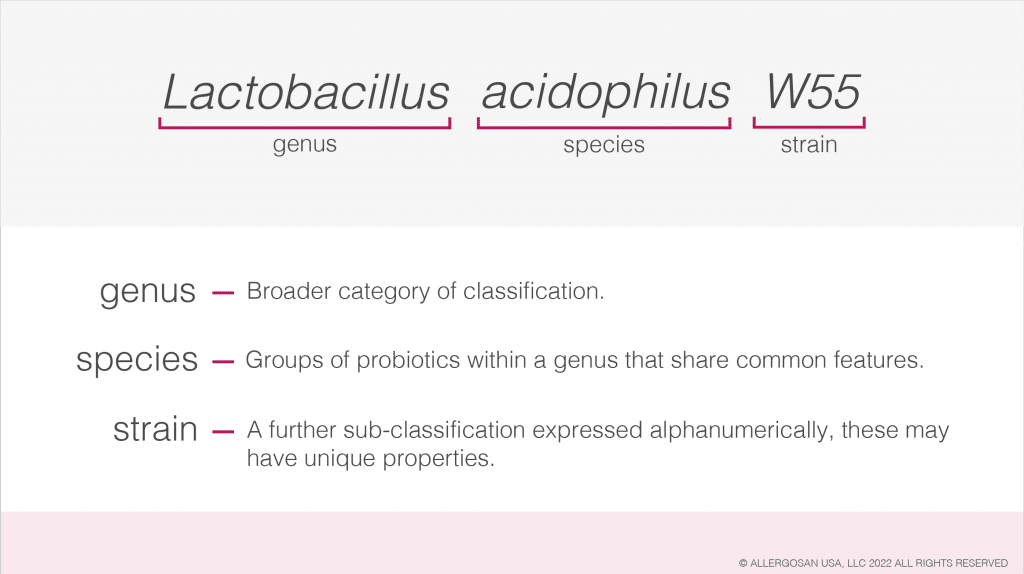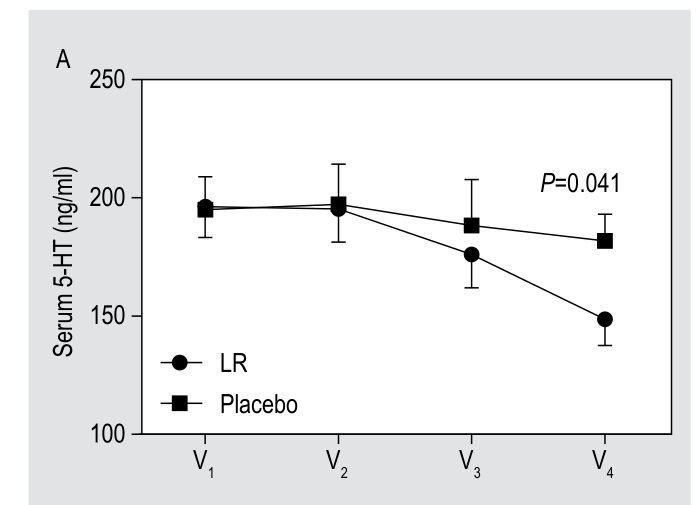L. Reuteri
-

I don't know to which strains it applies, but it's worth being aware of:
Safety of D(-)-Lactic Acid Producing Bacteria in the Human Infant
"Lactobacillus reuteri ATCC 55730 (also called SD2112) is a proven probiotic with the capacity to reduce infections and diarrhea in infants (9-11), and it has been suggested that this probiotic may also have immunomodulatory effects against allergy. It is one of many species of Lactobacillus known to produce both L(+)-lactic acid and D(-)-lactic acid through normal sugar fermentation. Safety evaluations on L. reuteri ATCC 55730 have been performed in controlled clinical trials on healthy volunteers (12) and immunocompromised (HIV-infected) adults (13), children, and infants (10,11,14) without adverse effects. The present study investigates the levels of D(-)-lactic acid in the blood at the age of 6 and 12 months in infants who have been supplemented daily with the probiotic from birth."
"We observed no adverse events after long-term dietary supplementation with L. reuteri in the newborn infants participating in this study. This is in line with the literature because only in cases of short-bowel syndrome, where significant commensal flora overgrowth occurs spontaneously, is there possibly a risk of excessive spill over of D(-)-lactic acid into the blood and consequent D-lactic acidosis (7,30). Even in such cases, however, D(-)-lactic acid producing L. plantarum supplements have in fact been demonstrated to reverse D-lactic acidosis (31). Furthermore, infants supplemented with L. reuteri ATCC 55730 at doses up to 10^11 CFU/day show no evidence of overgrowth of total lactobacilli or symptoms associated with D-lactic acidosis (10,11)."
-
@Amazoniac yeaahhh... I had some concerns too, because of some old posts by Georgi...
Well, the study below finally provides direct evidence that Lupus can be triggered by a bacterial strain commonly found in many probiotic products - Lactobacillus reuteri.
Lactobacillus reuteri - WikipediaIn light of the continuously accumulating evidence that bacterial overgrowth in colon has a role in virtually all chronic diseases, I would be very wary of exogenous supplementation unless there is proven colonization with a much more dangerous pathogen.
https://www.cell.com/cell-host-micr...7.383612938.1545923258-233655730.1545923257#
https://www.genengnews.com/news/microbiome-changes-through-diet-may-help-ease-lupus-symptoms/“We dissected, molecularly, how diets can work on the gut microbiome,” said senior author Martin Kriegel, M.D., Ph.D., associate professor adjunct in the department of immunobiology, Yale University School of Medicine. “We identified a pathway that is driving autoimmune disease and mitigated by the diet.” The paper, A Diet-Sensitive Commensal Lactobacillus Strain Mediates TLR7-Dependent Systemic Autoimmunity was published recently in Cell Host & Microbe. The team first identified the bacterium, Lactobacillus reuteri, in the gut of the mice that triggered an immune response leading to the disease. Specifically, in the Toll-like receptor 7 (TLR7)-dependent mouse models of lupus, L. reuteri stimulated immune cells known as dendritic cells, as well as immune system pathways that exacerbated disease development."
###### this sux cuz I want a quick fix for my infectious problems

I'm not beyond looking for some evidence that results can be safely found in moderation.
-
Looks like like some strains can pull heavy metals from the body and protect against them.
"Excellent probiotic, metal sorption and adhesive characteristics of newly identified Lact. reuteri strains Cd70-13 and Pb71-1 were isolated, which indicated their high potential abilities to survive in the intestinal milieu and to uptake the tested metals from the environment."
"...administration of the potential probiotic L. reuteri P16 had several beneficial effects on growth performance and immune responses, decreased Pb accumulation in tissues, and reversed alterations in hematological responses of C. carpio. Furthermore, it offered direct protection against Pb-induced oxidative stress. Therefore, L. reuteri P16 may be a novel dietary supplement for enhancing growth performance and preventing Pb-exposure-induced toxicity in fish in aquaculture and aquatic products."
-
L. Reuteri is so beneficial that it might be worth the small risk. And even amongst auto-immune conditions there are studies showing that it helps. So it might be beneficial there, too. But it's always good to watch out for symptoms as this seems to be an individual response.
- Lactobacillus reuteri Reduces the Severity of Experimental Autoimmune Encephalomyelitis in Mice by Modulating Gut Microbiota
- Resetting microbiota by Lactobacillus reuteri inhibits T reg deficiency-induced autoimmunity via adenosine A2A receptors
-
@Mauritio interesting. Thanks for the studies
-
@Mauritio said in L. Reuteri:
L. Reuteri is so beneficial that it might be worth the small risk. And even amongst auto-immune conditions there are studies showing that it helps. So it might be beneficial there, too. But it's always good to watch out for symptoms as this seems to be an individual response.
- Lactobacillus reuteri Reduces the Severity of Experimental Autoimmune Encephalomyelitis in Mice by Modulating Gut Microbiota
- Resetting microbiota by Lactobacillus reuteri inhibits T reg deficiency-induced autoimmunity via adenosine A2A receptors
According to the second study above L. Reuteri is a A2A agonist, so it should promote relaxation and sleep.
For me it does the opposite, I get more energetic and driven from it I'd say. So there must be something else that outweighs this effect. -
L. Reuteri activates the bile acid receptor FXR. I have often talked about the benefits of activating this receptor. So this is another plus for L. Reuteri.
I also saw another study wjere it helped alcoholic liver disease supposedly by increasing PUFAs in the liver. But if it really increased PUFAs then there must be something outweighing that effect (or PUFAs are actually good for the liver which I don't think.) and that might be activation of FXR.
-
The theory of L. Reuteris evolutionary success is that it increases its survival by increasing host (human) social status.
It increases testosterone and DHT. And testosterone has been shown to increase social status.
It increases oxytocin so that refers to the social part in social status. As it has been shown in chimps that not the most aggressive, tyrannical alpha male has the longest reign, but the most social one, that engages in the most amount of reciprocal social activity (grooming) .
Thirdly it also increases looks in animals by increases skin and hair health and making it more shiny.
I would say: it covers all the bases. Not bad for single bacteria species. And remarkable how these tiny microbes influence our behaviour, without us noticing .
-
@Mauritio I wonder if you can isolate the Reuteri without the L.

-
@LetTheRedeemed what do you mean by that?
-
@Mauritio remove the Limosilactobacillus

Just kidding…
-
I keep browsing thru this thread:
https://raypeatforum.com/community/threads/gut-bacteria-may-cause-all-autoimmune-conditions-antibiotics-can-cure.22983/page-3It looks like the best course of action will be to definitively kill (as best can be reckoned) infection of the lymphatic system, then it may be safer to try a probiotic.
L reuteri will definitely be in my short list of things to try
-
In this study they showed that feeding flies L. Reuteris (ATCC strain SD-5865) it increased their life span by about 14%.
The mechanism was (amongst others)a decrease in IGF1, similarly to protein restriction.
Young flies were especially susceptible to the effects, their food intake was increased by 53% and their activity level was increased by 95%. l. Reuteri is/was part of the human milk microbiome so maybe it is supposed to be there in young animals
The flies also weighed less and consumed more food.
L. Reuteri decreases the abundance of bacteria in the gut, mostly by production reuterin. Giving flies reuterin alone increased their life span by up to 11% , indicating that it is largely responsible for the the life span. Increase of L. reuteri.
-
@AinmBeo
I've always made yogurt with raw milk.
Do you use skim or whole milk? -
@happyhanneke
Skim A2 pasteurized cow milk -
I use pasterized or ultra pasterized milk. For me, the idea is to have only the reuteri bacteria fermenting. Other strains of bateria in raw milk may also grow during the process and compete with the reuteri.
-
@LetTheRedeemed said in L. Reuteri:
@Amazoniac yeaahhh... I had some concerns too, because of some old posts by Georgi...
Well, the study below finally provides direct evidence that Lupus can be triggered by a bacterial strain commonly found in many probiotic products - Lactobacillus reuteri.
Lactobacillus reuteri - WikipediaIn light of the continuously accumulating evidence that bacterial overgrowth in colon has a role in virtually all chronic diseases, I would be very wary of exogenous supplementation unless there is proven colonization with a much more dangerous pathogen.
https://www.cell.com/cell-host-micr...7.383612938.1545923258-233655730.1545923257#
https://www.genengnews.com/news/microbiome-changes-through-diet-may-help-ease-lupus-symptoms/“We dissected, molecularly, how diets can work on the gut microbiome,” said senior author Martin Kriegel, M.D., Ph.D., associate professor adjunct in the department of immunobiology, Yale University School of Medicine. “We identified a pathway that is driving autoimmune disease and mitigated by the diet.” The paper, A Diet-Sensitive Commensal Lactobacillus Strain Mediates TLR7-Dependent Systemic Autoimmunity was published recently in Cell Host & Microbe. The team first identified the bacterium, Lactobacillus reuteri, in the gut of the mice that triggered an immune response leading to the disease. Specifically, in the Toll-like receptor 7 (TLR7)-dependent mouse models of lupus, L. reuteri stimulated immune cells known as dendritic cells, as well as immune system pathways that exacerbated disease development."
###### this sux cuz I want a quick fix for my infectious problems

I'm not beyond looking for some evidence that results can be safely found in moderation.
I agree with Mauritio and don't find these issues too concerning, but it's good to know what it's doing. Lactate production may have a temporary antimicrobial effect, which would help to eliminate pathogens. If for some reason it disturbs the gut afterwards, the person can try to recolonize it with other microbes. Lactate can also be cleared locally before absorption.
- Lactate is mainly fermented to butyrate by human intestinal microfloras but inter‐individual variation is evident
- Lactate-Utilizing Bacteria, Isolated from Human Feces, That Produce Butyrate as a Major Fermentation Product
- Lactate- and acetate-based cross-feeding interactions between selected strains of lactobacilli, bifidobacteria and colon bacteria in the presence of inulin-type fructans
- Impact of pH on Lactate Formation and Utilization by Human Fecal Microbial Communities
- Rates of production and utilization of lactate by microbial communities from the human colon
- Microbial lactate utilisation and the stability of the gut microbiome
- Intestinal Short Chain Fatty Acids and their Link with Diet and Human Health
- Metabolism Characteristics of Lactic Acid Bacteria and the Expanding Applications in Food Industry
I think that a greater concern would be the competition for vitamins that occur in the gut and eventually depleting those that are already low. Stuffing yourself with probiotics may call for temporary use of topical vitamins.
-
@Amazoniac are you aware of any vitamins that L. reuteri consumes?
I only recall reading about it producing B12, but other than that I haven't come across anything like that. -
@Amazoniac interesting. Thank you much brother.
Funny, I’m quoting these old rpf threads to y'all, but y'all were in them lol @Mauritio
-
L. Reuteri 6475 potently increases the serotonin Transporter SERT, which picks up serotonin and thereby reduces its availability.
They also showed that it reduced colitis in a rat model and lowered inflammatory cytokines like IFNy or TNF.https://pubmed.ncbi.nlm.nih.gov/34550056/
DSM 17938, the other strain in Bio Gaia's Gastrus, also decreases serotonin. In this case directly.
Interestingly the effect took a while to show,but after that inertia, the longer they took it the more it lowered serotonin.
